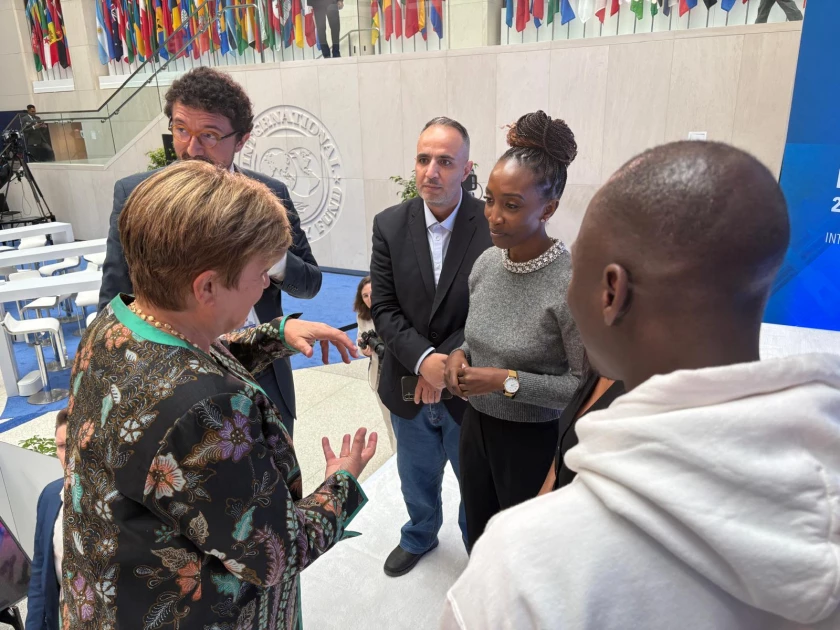IMF warns Trump tariffs will hurt global economy

Citizen TV's Yvonne Okwara with the IMF Managind Director Kristalina Georgieva, on the sidelines of the IMF Spring Meetings 2025 in Washington DC.
The International Monetary Fund has warned that US President Trump’s tariffs will severely damage the global economy.
The April 9 announcement has triggered a wave of economic policy uncertainty as world leaders react and respond to the global reciprocal tariffs, with China being the hardest hit.
As a result, the fund has downgraded the global economic growth to 2.8%, a significant drop from the earlier prediction of 3.3% for 2025.
For Sub-Saharan Africa, which includes Kenya, the IMF has downgraded the economic growth to 3.8% from 4%.
While the IMF does not predict a global recession, the distribution of the impact of the global trade tensions will be uneven based on country-specific vulnerabilities.
The risks and uncertainties remain elevated. But what are the major risks facing countries around the world, particularly those in emerging and frontier markets like Kenya?
First is rising debt levels. The IMF predicts a risk of debt levels rising to 117% of GDP across the world, levels not seen in decades.
Debt levels in developing economies could go even higher, interest rates could rise to higher levels, eating up a larger share of the budget. This could then result in crowding out social and infrastructure spending.
Secondly, the trade tensions and global policy shift have also shifted foreign development aid, which is now declining as Western donor countries shift the development spending and lending towards defence budgets.
This will result in fewer flows to developing countries. Experts opine that Kenya’s export market, which includes goods like Tea, Coffee and horticulture, could be impacted by weakened demand from key markets like the US, Europe and China.
This, even as Governor Thugge downplayed the impact, saying that there will be minimal effect on Kenya’s balance of payments, and that exports to the US market will reduce by roughly $100 million.
Where do the solutions lie? Experts at the IMF Spring Meetings believe that the first line of defence for countries is to look inward and align their domestic agenda.
Governments must now look to building resilience, create a credible fiscal path, and implement sound monetary policies to back fiscal consolidation programs that would be attractive to investors.
Vítor Gaspar, the Director, Fiscal Affairs Department at IMF, recommends that countries implement gradual fiscal adjustments, mobilise additional revenues by expanding the tax base, eliminate subsidies that could be distortionary and think of policies needed to boost growth.
But, while these reforms could be unpopular in countries such as pension reforms and subsidies withdrawals in sectors such as energy, experts believe they could generate fiscal savings.
For countries such as Kenya, policies such as increasing revenue mobilisation and widening the tax net could be a difficult pill to swallow for citizens who already feel overtaxed and overburdened by the country's burgeoning debt burden, which now stands at over Ksh.11 trillion.
This is on the back of local political, social and economic tensions that led to the rejection of the Finance Bill 2024, and with a new bill round the corner.
This is the tight balance that governments will have to manage, considering the tight space they find themselves in, with global pressures weighing down on them.
The all-important task for them will be how to keep the economy resilient while protecting the most vulnerable segments of society.
For this, the role of civil society and governments will be needed to manage public sentiment.
Any measures implemented will need to be timely to protect the most vulnerable in society. This must all be coupled with communication to build consensus and explain the trade-offs to members of the public.
IMF Managing Director Kristalina Georgieva, who has termed this year’s spring meetings as a “vital meeting for a vital time”, sees the current crisis as an opportunity for “countries to put their affairs in order.”
She argues that countries can use this as an opportunity to take stock. The need for countries to build their own resilience, cut red tape, use exchange rates intelligently and embrace technology and AI-driven solutions, as well as work towards removing tariff and non-tariff barriers.
Overall, macroeconomic and fiscal stability measures are now more important than before.
A more strengthened and independent central bank will lead the way forward. Something that the Governor of Kenya’s Central Bank, Dr. Kamau Thugge, who is part of the delegation at the Washington DC meetings, along with the Kenyan Treasury led by Cabinet Secretary John Mbadi, will no doubt be seeking to manage.
Want to send us a story? SMS to 25170 or WhatsApp 0743570000 or Submit on Citizen Digital or email wananchi@royalmedia.co.ke
Comments
No comments yet.


Leave a Comment